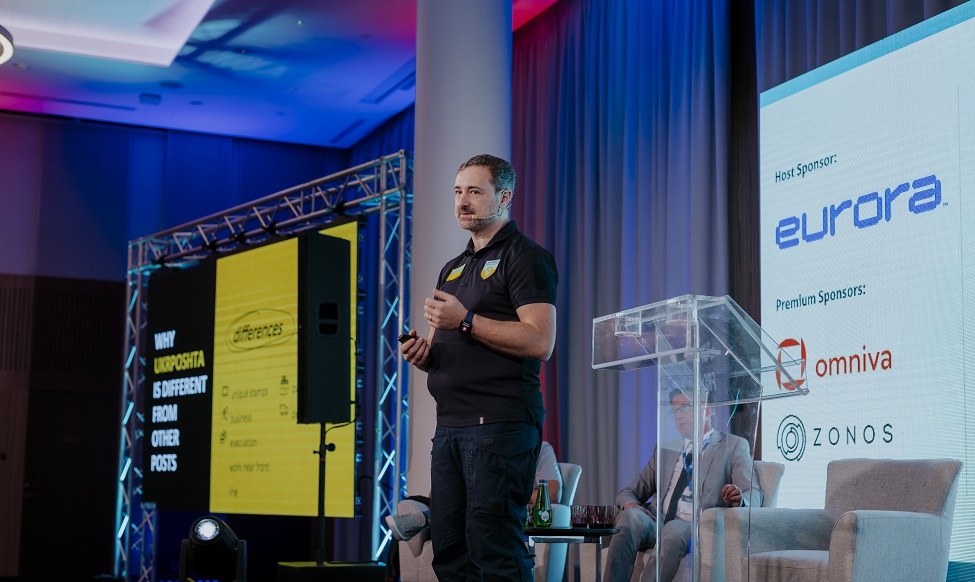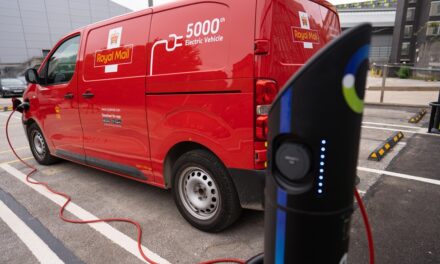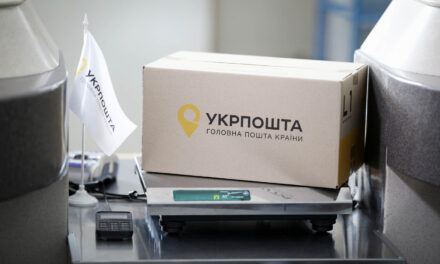
Ukrposhta’s unstoppable ambition

Fresh from picking up three World Post & Parcel Awards in Tallinn this month, including the prestigious Industry Leadership award; Post & Parcel spoke to Igor Smelyansky, CEO of Ukrposhta. Igor has been responsible for maintaining postal services across Ukraine and leading around 70,000 postal staff during a full-scale war.
In this interview Igor discusses delivering mail by boats because of the burst dam, the significance of physical money for Ukranians living in occupied territory, why uplifting stamps resonate with Ukranians during wartime and what drives him to keep going and pushing forward, however difficult things get.
I wanted to start by congratulating you on winning three awards – what do they mean to you and the team?
I feel like I can retire!
Seriously, it is really great for morale. After a year and a half of war, the tiredness kicks in. What the Russian forces are now doing is trying to wear down our psyche, particularly with the bombings, night after night. It is hard for people to go on. So, good news like this, this high estimation of our work really helps to keep our morale up. And the second point is that it is an incentive to continue to improve. I told the team we should celebrate these awards – it is credit to our hard work – but it also provides us with the motivation to deliver all the plans we have for this year so our clients can see we are improving every day.
What are your plans for the coming year?
So I know people usually don’t do this during war. But nevertheless, we plan 100% digitalization, so all our transactions will go paperless. We are about 50% there. We are planning to roll out 1,500 generators covering the entire country. And we want to make sure our system can function even if there isn’t electricity or internet connection. We are designing a wireless handheld device which has a computer, a scanner and a camera, which our mail carriers can use to upload all the data they need for the day including delivery information, payments data etc. And if there is internet connection – excellent – they will work online but if there is no connection that can work offline and then at night they can use a Starlinks generator to exchange the data. And people will be able to use a mobile app to send parcels.
Are you planning to expand Ukrposhta’s railway service?
Right now we are working on creating some new routes. We need to improve our service because people expect next day delivery. So when we need to deliver across the country, railway is the way to go. And I also hope that we’ll finally launch our railway into Europe. We’ve been trying to do it for more than a year. We hope to launch it and set an example for the industry to show how delivery can be more sustainable.
Will you continue to use railways to deliver after the war?
I think so. I want to be clear that we are using postal cars connected to passenger trains, not to cargo trains, like they do in Germany. Cargo trains don’t run on schedule, they run when they’re ready. But the passenger trains run on a schedule so we know exactly when we ship a parcel, when that train will be at the point of destination. In Ukraine, there are lots of night trains, so if a train leaves a 10pm it will arrive at 7am. This gives our clients the certainty and quality of service they expect.
How has the burst dam in Kakhovka affected logistics?
So in the region which was flooded, we are now using boats to deliver mail and pensions. I was in Kherson yesterday and what I’ve seen is really bad – in many cities there is no drinking water. So now we have to provide large volumes of water so people can continue their work. That’s a new challenge we have to solve. As the water subsides life will go back to normal – relative normal – because many clients had to leave their houses but they are now coming back.
Also some of our railway connections went down in the water but when I was driving yesterday I saw them repairing the lines so I think it will be relatively fast to restore operations.
How can you prepare for this new challenge?
Given what we now know about the Russian forces, the more the counter offensive continues, the more they will blow stuff up. So we need to have boats to cross rivers otherwise it can take around 3 hours to drive to affected areas. Earlier today we had a meeting about buying more boats so we have some on standby in case we need them in other parts of the country.
How do you keep track of people’s addresses when people are being forced to move from one area to the next?
I have a telegram board where staff check in where they are once a week, but that’s also one of the reasons I am constantly visiting all the regions – to understand where people are and how the volumes are. For example, yesterday I was in a village and last time I went there were 1,000 people and now there are 2,000. So our staff working there said we need to increase the number of hours they work. That’s why digitalization is important. So we can see the daily number of operations and transactions and we can quickly adapt and react.
It’s a big change for a postal operator – we used to operate within key regions but now we focus on which roads are accessible on a given day – if we can’t get to one region because a bridge has been blown up and another region is easier to service that day then we have to adapt our service until the bridge is restored. The most important thing is that you build adaptable infrastructure that you can use, no matter what happens.
How difficult is it for you to balance the safety of your staff while trying to deliver to the people who need it?
It is a very difficult situation. I’ll give you an example – when people were evacuating on the boats after the dam burst, Russian soldiers began shooting at them as they tried to leave. It is hard to comprehend that people would do something like this. Yesterday, I went personally to thank our teams that are working on the boats, that despite all the risks, they went and delivered to their clients.
How have your staff impressed you over the last year and a half?
When I was presenting at WMX Europe, people asked me: how do you push people to work in those conditions? I said actually I don’t have to – people feel so attached to their clients. sometimes I have to stop them from putting themselves in danger – it’s extremely impressive. I mean, people who were afraid left Ukraine. And those that stayed, continue to impress me every day with their dedication.
I also think that this work helps them to overcome their situation – it is something that they look forward to in the morning and even after a hard night when they wake up, they have a reason to go somewhere, to help someone, to feel needed and appreciated.
How important is physical money for Ukrainians during wartime?
Unfortunately it is very important at the moment. We have learnt that the banking system doesn’t work when there is no electricity or internet connection.
So for people who are living in occupied territory to feel like they’re back in Ukraine, they need to hold the physical Ukrainian currency again as everything is in Russian Rubles. What I’ve witnessed myself, when we deliver either pension payments, Red Cross payments, or United Nations payments; we throw Ukranian currency into the local city or local village economy and people start exchanging. They start going to bazaars and buy goods from each other.
To people who haven’t had any power or internet connection for three or four weeks, this physical money becomes mentally extremely important because it’s a part of them feeling Ukrainian again.
I heard Ukrposhta is trying to acquire a bank?
Yes I hope we can complete the acquisition soon so we can help people by providing that service. The bank we are trying to acquire has been confiscated from Russian shareholders. So we can hopefully put this to good use.
Thats another reason we want to roll out our handheld devices because it will mean people won’t need physical cash to make payments.
How are you dealing with the volumes during wartime?
We try to increase our volumes every month. I’m pretty confident that after we complete our modernisation we will see parcels volumes go up again. I just came back from some really devastated areas of the Kherson region. Some of the postal branches are literally destroyed. But in one area, the local authority gave us a small room to work in until the branch has been rebuilt. When we entered the room we were shocked to see a huge amount of parcels. Because there are no stores, people are regularly buying basics and things like medicine online, because there are no pharmacies. Sometimes people move away because of the war, or they need to ship back their belongings when areas become safe again so people are sending their belongings in parcels.
It is pretty cool to see the volumes of parcels, even in those devastated areas.
Is e-commerce still important to Ukrainians during the war?
Once we take back a city, e-commerce is restored basically the next day. So the question is more whether the owner of the company is alive and going to return to the area if a store has been destroyed by war. For example if a company operates in an area where there are now much less people they have to decide whether it is worthwhile to open a store for 100 people when they used to serve 2,000. E-commerce helps to fill that void so people can still sell and people are able to buy what they need.
What is Ukrposhta doing to support e-commerce businesses in Ukraine?
We are doing two things. We’re trying to implement new services and improve the speed of delivery, because as I mentioned, people’s demands are going up. They want next day delivery and they want cheap delivery because Ukranian economy has not yet recovered. So we’re trying to offer that to help businesses.
We are also supporting veterans who are coming back from war by teaching them how to start their own businesses and how to sell on Etsy, Amazon and eBay.
Helping them set up their own businesses can help them feel part of society again and support their families.
You’re operating in a very different environment to most people in the sector, but what do you think other companies can learn from the way in which you’re constantly adapting and planning for disruption?
So I’d say regardless of your situation your postal system needs to be ready to operate no matter what, because then it gives people a sense of security that it will continue to operate under any conditions.
If you have power that is nice, if you have no power the system is still up and running. If there is a good internet connection then the postal system will work but if there is none it will still operate because unfortunately, we live in a world where there are cyber attacks, physical attacks, there are natural disasters and there are lots of different things that can go wrong. And if you already have those procedures thought out you will be prepared. In Ukraine we have had to learn on the go but others can learn from our experience.
How important are the war stamps for Ukrainians?
We’ve set the bar high. As I mentioned, we are planning to release a new stamp and you can imagine the level of expectation for that. The stamps for us are the barometer of people’s mood. Right now we feel like the stamps which are funnier or more positive resonate with people.
This war is a war of emotions, and you have to keep the emotions up to win in this war. So we hope to maintain the level people expect.
If you were to imagine the victory stamp you will release when this is all over, what would it look like?
I’m often thinking about it but I don’t know, because so many people will expect so many different things from that stamp. We will need to see closer to the time, what the situation is, what we have achieved and what the price was, and then I think that will determine the model. What I have learnt is, the fresh emotions and quick reactions are always the best. I joke with my colleagues from other companies, as they approve stamps around two years in advance, but I cannot approve it two months in advance, because we want to be relevant.
The reason our stamps are so popular is because they encapsulate what people feel at that point.
And I wish I knew two years in advance, what people will feel but the stamps need to give them what they need at that particular time, in that particular moment. So our production time between idea to stamp design to publication is very short – it is within one month.
Where does your drive comes from?
Because we want to win. And I think many people in Ukraine were surprised by the country they thought was their neighbour, and now they’re really determined to prove that we can win, and not just win, but we can move forward.
So when we build things we aren’t just doing it for now we are anticipating the future and so we can be working the day after the invasion ends. And the other thing is, in this situation you should never stop, because it’s much harder to restart if you stop than if you just keep going, no matter how difficult it is.
And I think this helps us everyday, because if you just focus on how to survive, that’s really not such a nice picture. You need something cool in front of you, that helps you in the most difficult situations to get up and go. And what also drives me is that every time I meet clients they appreciate what we do. And my staff really feel the appreciation – if they didn’t they wouldn’t be prepared to get on the boats which could be shot at.
How would you like the sector to support Ukrposhta?
In terms of support, I just want everyone to work with us. We are thankful for every donation and help that we get. And I was glad that I was able to personally thank those postal operators who have supported us at the WMX Europe conference and it’s very important, but in the long term, the best relationships are based on business. We want to work with our colleagues in other countries.
I know it sounds strange for me to talk about this during wartime but people still want fast delivery, even though we don’t have any airports open, people expect our deliveries to be maximum eight days to the US for example. We need to be relevant otherwise we’re going to lose to our competitors.
As the winner of the Industry Leadership award, do you have any message to the sector?
The message is: stay cool and stay relevant. The postal service can be cool, can be modern and can be unexpected. Well-known companies like Amazon, Tesla and Google are driven by visionaries and ideas. People go and work for them because they have cool ideas and cool projects that impact millions of people. Working in the postal sector can also feel like we are doing something really good. I think we have a unique industry that impacts the lives and commerce of millions of people. We just need to find really modern ways of doing operations so our clients will like what they see and we can attract the best people to the sector.
Written by Emily Ross-Joannou
Please note this interview was conducted on 21 June 2023. Facts and circumstances may have changed.











